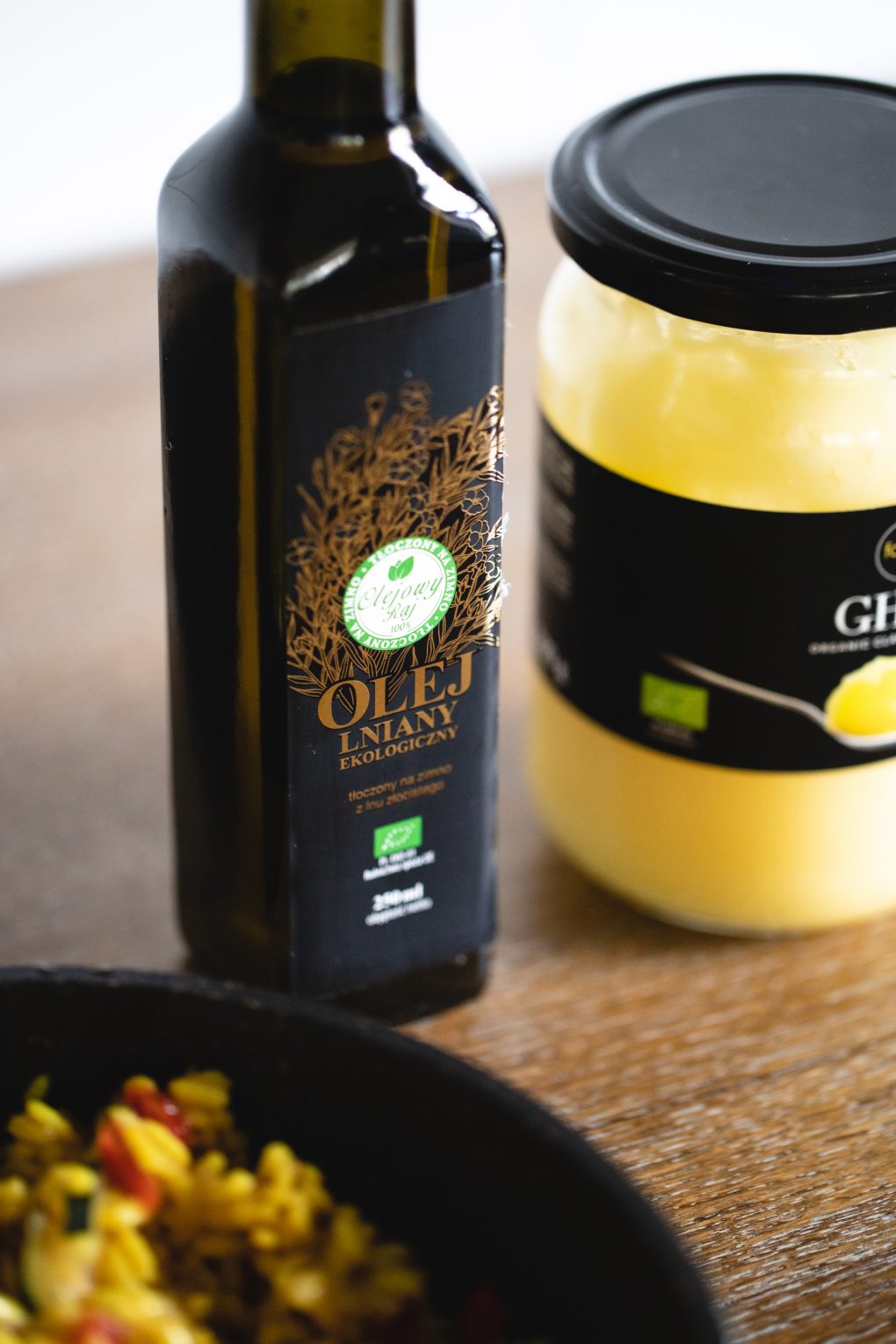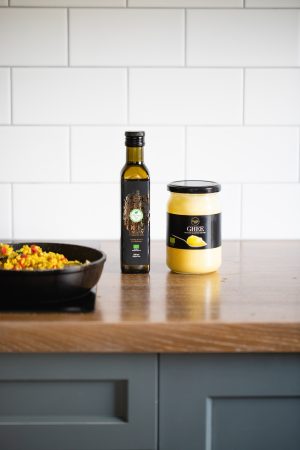
Cold-Pressed Oils
Organic food, produced in a simple, safe and the least harmful way, is gaining more and more popularity. A growing number of people make conscious choices and realize that natural products and unprocessed foods are an important part of the diet. What’s more, we pay more attention not only to the composition of products, but also to their origin, method of production and environmental impact. I must admit that I am very happy about these trends ?
Cold-pressed oils are one of the most popular types of natural products. Probably many of you have come across terms such as “cold-pressed oil”, “virgin” or “unrefined”. These are just some of the names that manufacturers use to encourage consumers to buy oil. Are cold-pressed oils actually healthier and more valuable for our body, or is it just a simple marketing gimmick? I will try to answer these and other questions in this post.
How cold-pressed oils are obtained
Cold-pressed oils are obtained from:
- seeds (e.g. rapeseed, flax, sunflower, borage, pumpkin, grapes, raspberries)
- fruit (e.g. olives)
- nuts (e.g. walnuts, hazelnuts or argan nuts)
- sprouts (e.g. wheat sprouts)
The taste, smell, and nutrient content therefore depend on the individual raw materials used in the production, as well as on their storage conditions and production methods.
How is cold-pressed oil made?
Cold pressing with mechanical methods is a process during which the pressing temperature does not exceed 40°C which guarantees the preservation of valuable health and taste properties contained in the grains. Cold pressing is the oldest natural method of oil extraction, and it is considered ecological as no solvents are used throughout the process.
For comparison, classic oils are pressed at 160ºC, and additionally refined (purified) at a temperature of up to 300ºC. As a result, the seeds are deprived of many valuable nutrients. Moreover, refining leads to a product that is neutral in taste.
Cold-pressed oils as functional food
Consumers more and more often choose functional food, i.e. food with health-promoting properties. Apart from its nutritional function, it also improves health and well-being and/or reduces the risk of diseases. Cold-pressed oils are functional thanks to the presence of various bioactive substances. They are a rich in polyunsaturated fatty acids and sterols, which have a bioactive effect, and antioxidants such as tocopherols and polyphenolic compounds. The substances contained in the oils may prevent or counteract many civilization diseases, such as cardiovascular diseases, cancer or obesity, and may also delay the aging process.

Health benefits of cold-pressed oils
Cold-pressed oils are a very valuable source of essential, unsaturated fatty acids (EFAs). The human body is not able to synthesize them on its own, which means that it is necessary to constantly supply them with food. Omega-3 and omega-6 polyunsaturated fatty acids have a positive effect on the lipid profile, reducing the level of LDL cholesterol, i.e. bad cholesterol, thus preventing the development of atherosclerosis. They regulate the work of the cardiovascular system and help maintain normal blood pressure. In addition, they counteract the degeneration of neurons, i.e. protect against damage to the cells of the nervous system, and thus contribute to lowering the risk of developing Alzheimer’s disease. They also have anti-inflammatory and anti-allergic properties.
Omega-3 fatty acids are particularly important during the development of the fetus and in early childhood, because they influence, among others, the proper development of the brain and the formation of vision.
Other substances found in cold-pressed oils are antioxidants, such as tocopherols and polyphenolic compounds, which exhibit antioxidant properties. They play an important part in reducing oxidative stress, i.e. a condition caused by the accumulation of free radicals that damage the cells and tissues of the body, and consequently contribute to the development of many chronic diseases, including diabetes, atherosclerosis, heart disease and even cancer.
Plant sterols, or phytosterols, are another group of compounds present in oils that have a beneficial effect on human health. Phytosterols have the ability to lower LDL cholesterol and total cholesterol in the blood by limiting the absorption of cholesterol from the intestines. Thus, they provide a natural protection against cardiovascular diseases. Research studies show that the consumption of 1.5-2 g of plant sterols or stanols lowers the plasma concentration of LDL cholesterol by 9-14%. What’s more, plant sterols are believed to exhibit anti-inflammatory, antibacterial, anti-ulcer and even anti-cancer properties.
Cold pressed or refined oil?
Each oil is different not only in terms of the content of bioactive compounds, but also in taste, smell and durability. A lot of factors come into play here, such as the type of raw materials used for production, storage conditions and production methods.
One of the main advantages of using cold-pressed oils is the high content of monounsaturated and polyunsaturated fatty acids, as well as the presence of antioxidants such as tocopherols and polyphenolic compounds, which exhibit high antioxidant activity. Cold-pressed oils are characterized by a higher content of linoleic and linolenic acids, which are essential fatty acids (EFA). This means that these oils have a greater nutritional value and therefore their positive health effects are greater. In addition, cold-pressed oils have a characteristic taste and smell, corresponding to the raw material from which they were produced.
However, in the case of popular refined oils the content of many valuable ingredients, such as tocopherols, sterols or polyphenolic compounds, is reduced as a result of pressing at a very high temperature and during the refining process. In addition, refining leads to a product that is neutral in taste and smell.
Kitchen use
The Polish Food and Nutrition Institute recommends increasing the supply of vegetable fats, especially those consumed cold, and reducing the supply of animal fats. How can we use these raw oils? There are many possibilities, for example: sprinkling salads, as an addition to dips or dressings, as an ingredient for pesto or sandwich spreads, which are a great alternative to butter, or simply to drizzle over bread.
What about frying? If you decide to use this cooking technique, the use of refined oil will be a much better choice. Why? Because cold-pressed oils have a lower smoke point, the temperature at which fat breaks down and loses its nutritional value. On the other hand, in the case of popular refined oils, the refining process affects the composition of fatty acids, and thus their durability, making refined oils more stable during frying. The lower the smoke point, the worse the fat is for frying. It is recommended to heat treat fats that have a smoke point above 200°C.
Study this comparison: the smoke point of unrefined rapeseed oil is 130°C, and of refined oil 240°C. It is similar for sunflower oil, the temperatures of which are respectively: 107°C and 220°C. By contrast, the cold-pressed olive oil has a smoke point of 191°C and linseed oil only 107°C.
Storage conditions
Cold-pressed oils, due to the fact that they are not subjected to high temperatures, are less chemically stable, which means that they are less stable during storage and can oxidize quickly. Therefore, they should be stored preferably in glass, dark and tightly closed bottles that limit the access of light, and in a cool place e.g. a fridge.
Summary
Growing consumer awareness is conducive to making better nutritional choices, and this includes choosing good-quality vegetable fats. Although cold-pressed oils account for a small share of the edible oils market, they are gaining more and more followers who prefer natural and unprocessed food. Cold-pressed oils show a higher nutritional value compared to refined oils, and are also characterized by a better taste and smell. Therefore, it is worth increasing their supply in the daily diet. Thanks to the content of bioactive compounds, they may reduce the risk of numerous civilization diseases.
Bibliography:
- Agnes N. Formulation of cold-pressed oils. Food Research Lab. 2021
- Cakaloglu B, Ozyurt V H, Otles S. Cold press in oil extraction. A review. Ukrainian Food Journal. 2018; 7(4): 640-654.
- Dobarganes C, Márquez-Ruiz G. Possible adverse effects of frying with vegetable oils. British Journal of Nutrition. 2015; 113(2): 49-57.
- Obiedzińska A, Waszkiewicz-Robak B, Oleje tłoczone na zimno jako żywność funkcjonalna. Żywność. Nauka. Technologia. Jakość. 2012; 1(80): 27 – 44.
- Siger A, Józefiak M, Górnaś P. Cold-pressed and hot-pressed rapeseed oil: The effects of roasting and seed moisture on the antioxidant activity, canolol, and tocopherol level. Acta Sci. Pol. Technol. Aliment. 2017; 16(1): 69–81.
- Wroniak M. Wartość żywieniowa olejów rzepakowych tłoczonych na zimno. Żywność. Nauka. Technologia. Jakość. 2012; 6(85): 79 – 92.









Comments No Comments
Join the discussion…